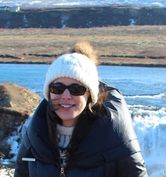Internship Spotlight: How to Design a Geothermal Resource Park
Internship Spotlight: How to design a Geothermal Resource Park
Two Iceland School of Energy students, Kimberly (Kim) Carpico and Shaun Tudor, are interning for Iceland Geothermal Cluster throughout the spring 2015 semester. They will receive 8 ECTS towards their master's degrees in Sustainable Energy Science and Engineering.
 Kimberly Carpico, There has [been] some small talk of entering this as a career…that being said there is exciting work to be done”.
Kimberly Carpico, There has [been] some small talk of entering this as a career…that being said there is exciting work to be done”.
According to the company website, “Iceland Geothermal is a platform where you can access all general information about geothermal energy in Iceland and leads you to the right coordinator if you are building up infrastructure or business in relation to the resource of geothermal”. With this in mind, Kim and Shaun are developing a Sustainable Energy Resource Park for industries, companies, and communities to specifically utilize waste heat and bi-products from district heating.
While their overall goals are the same, they will separately provide reports tailored to their backgrounds. Having an engineering background, Shaun is providing “a comprehensive and holistic approach to design, operation, and integration of energy resource parks”, while Kim is using business and marketing techniques to provide a cascading scenario focusing on greenhouses and aquaculture, or the alternative scenario of data centers and district cooling.
Shaun elaborates further on the process he's taking to collect data by stating, “I am managing the work segments through writing in each area, as well as facilitating work to contributors and co-authors. Half of the content is direct sourcing of previous projects and resources…the other half is conceptual, developing theories and processes that facilitate the core values of the resource park.”
Kim explains her process as, “I am collecting data from networks of people [I] have had the opportunity to interact with through the Iceland Geothermal Cluster. I [was] able to go to the Reykjanes Resource Park and visit some of the industries that are showcasing the many uses of direct-use geothermal waste heat, including a trip to Iceland's most profitable business – the Blue Lagoon”.
Networking with the professionals has proven to be advantageous, however challenges include “finding real economic values regarding previous direct use project costs, as well as revenues”, as Shaun states. The park also needs to maintain its “innovative spirit”, as it is formed in a more “holistic, organic fashion”, as Kim adds. “I could foresee a challenge of maintaining this novel approach, and at the same time implementing a plan of action that does not take away from this in exporting the idea of a Sustainable Energy Resource Park to other countries”.

Shaun Tudor, “I definitely see employment with related firms once my research is complete”.
When asked about what the future may hold, Shaun explains that “the concept is intended to further expand the Reykjanes Resource Park, as well as development of a 360 MW geothermal concession in Nicaragua. I definitely see employment with related firms once my research is complete”. Kim adds that “there has [been] some small talk of entering this as a career…that being said there is exciting work to be done”.
For now, they are enjoying the freedom of research given the abundance of resources available. This allows them to think creatively outside of the barriers as they encounter exciting challenges along the way. Both students have mentioned that they appreciate the time spent in class on geothermal discussions, as the terminology is helpful when speaking to industry professionals. Plans throughout the rest of their studies include developing thesis topics around their internship deliverables. They are eager to maintain continuing contact and fostering relationships with the people of various industries they meet throughout their experiences at Iceland Geothermal Cluster.
For more news about our student internships, check out our feature on Facebook and Twitter about MSc student Cari Covell; performing geothermal well tracer tests at Iceland GeoSurvey (ISOR).
